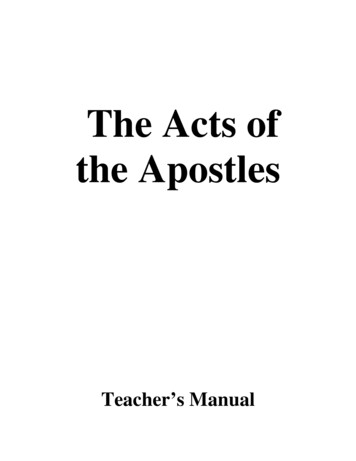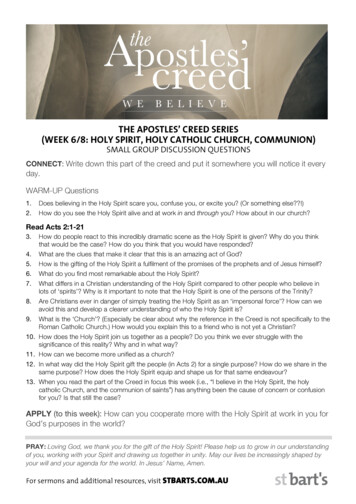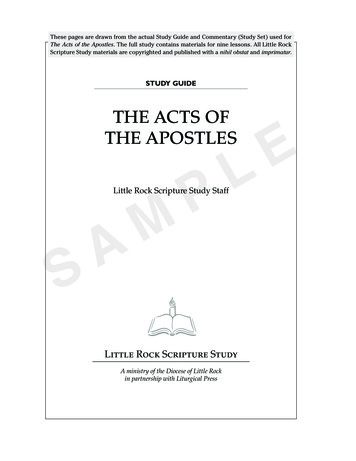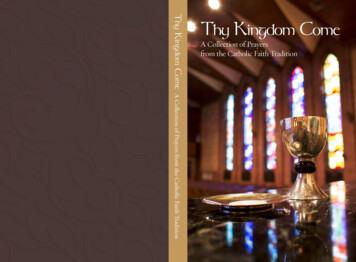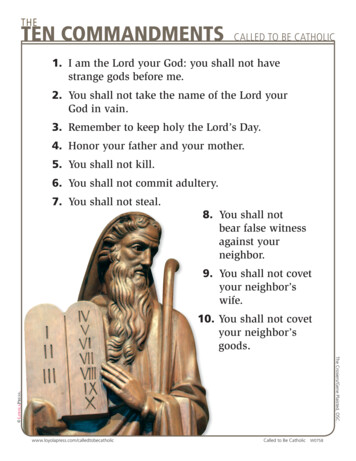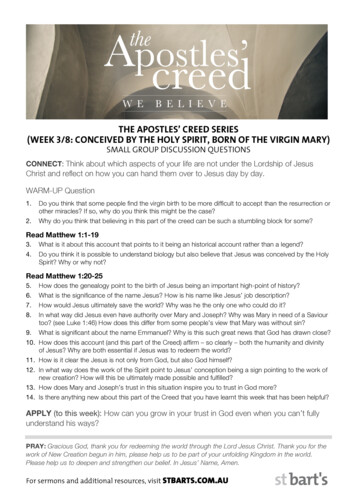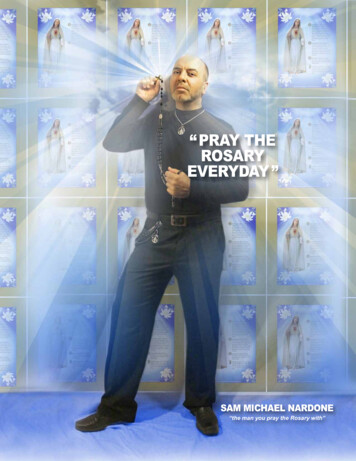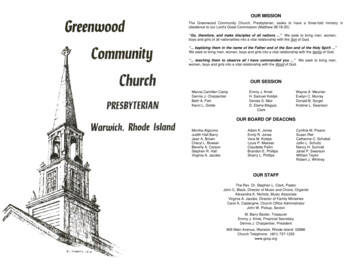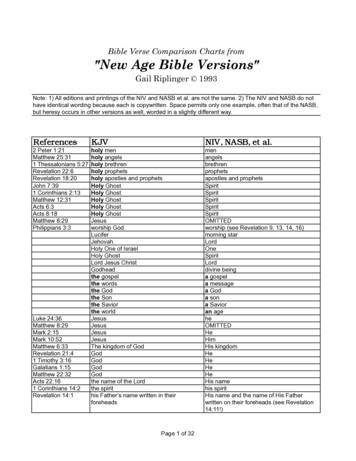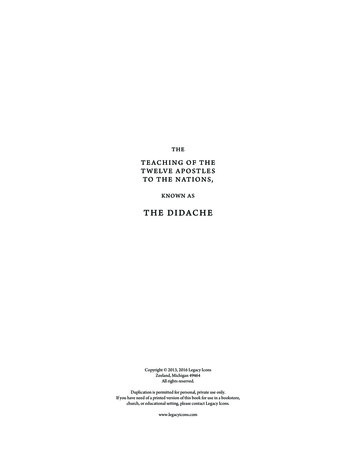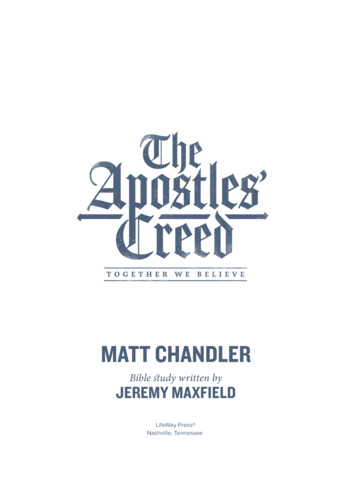
Transcription
MATT CHANDLERBible study written byJEREMY MAXFIELDLifeWay Press Nashville, Tennessee
Published by LifeWay Press 2017 The Village ChurchNo part of this book may be reproduced or transmitted in any form or by anymeans, electronic or mechanical, including photocopying and recording, or by anyinformation storage or retrieval system, except as may be expressly permitted inwriting by the publisher. Requests for permission should be addressed in writingto LifeWay Press ; One LifeWay Plaza; Nashville, TN 37234-0152.ISBN 978-1-4300-5457-3 Item 006103003Dewey decimal classification: 238Subject headings: APOSTLES’ CREED / GOSPEL / DOCTRINAL THEOLOGYUnless otherwise indicated, Scripture quotations are from the ESV Bible (TheHoly Bible, English Standard Version ), copyright 2001 by Crossway, a publishing ministry of Good News Publishers. Used by permission. All rights reserved.Scripture quotations marked NKJV are taken from tthe New King James Version .Copyright 1982 by Thomas Nelson. Used by permission. All rights reserved.To order additional copies of this resource, write to LifeWay Resources CustomerService; One LifeWay Plaza; Nashville, TN 37234-0113; fax 615.251.5933; phonetoll free 800.458.2772; order online at lifeway.com; email orderentry@lifeway.com;or visit the LifeWay Christian Store serving you.Printed in the United States of AmericaGroups Ministry Publishing LifeWay ResourcesOne LifeWay Plaza Nashville, TN 37234-0152
ContentsIntroduction 5About the Author 5How to Use This Study 6The Apostles’ Creed Grid 8Week 1I Believe In 10Week 2God the Father Almighty, Creator of Heaven and Earth 22Week 3And in Jesus Christ, His Only Son, Our Lord 34Week 4Who Was Conceived by the Holy Spirit; Born of the Virgin Mary 46Week 5Suffered Under Pontius Pilate; Was Crucified, Dead, and Buried 58Week 6He Descended to Hell; the Third Day He Rose Again from the Dead 70Week 7He Ascended to Heaven and Sits on the Right Hand of the Father Almighty 82Week 8From Whence He Shall Come to Judge the Living and the Dead 94Week 9I Believe in the Holy Spirit 106Week 10The Holy Catholic Church, the Communion of Saints 118Week 11The Forgiveness of Sins 130Week 12The Resurrection of the Body, and the Life Everlasting. Amen 142Leader Guide 154
I believe in God the Father Almighty,Creator of heaven and earth,And in Jesus Christ, His only Son, our Lord,Who was conceived by the Holy Spirit;born of the virgin Mary;Suffered under Pontius Pilate;was crucified, dead, and buried.He descended to hell; the third dayHe rose again from the dead;He ascended to heaven and sits on theright hand of the Father Almighty,From whence He shall come tojudge the living and the dead.I believe in the Holy Spirit,The holy catholic church,the communion of saints,The forgiveness of sins,The resurrection of the body,and the life everlasting. Amen.4
IntroductionIt’s easy for our culture of individuality and innovation to shape the way we thinkabout the church. So what should we believe? Should Christians try to be moreaccepting of a postmodern worldview? With so many questions, opinions, andinterpretations among people today—even within the church—what should weall agree on as essential to Christian faith?Finding its genesis in the apostles’ teachings, the Apostles’ Creed containsessential Christian doctrines and beliefs that summarize the gospel and make upthe foundation of our faith. The scriptural truths contained in the creed help us operatefrom good theology, with the knowledge that our faith is rooted in truth and a richhistory that spans past, present, and future. The lines of the creed aren’t mere words.They convey the essence of what we confess and believe as the body of Christ.About the AuthorMATT CHANDLER serves as the lead pastor of teachingat The Village Church in the Dallas/Fort Worth metroplex.He came to The Village in December 2002 and describeshis tenure as a replanting effort to change the theologicaland philosophical culture of the congregation. The churchhas witnessed a tremendous response, growing from 160people to more than 11,000, including campuses in FlowerMound, Dallas, Plano, and Fort Worth.Alongside his current role as lead pastor, Matt is involved in church-planting effortsboth locally and internationally through The Village, as well as in various strategic partnerships. Prior to accepting the pastorate at The Village, Matt had a vibrant itinerantministry for more than 10 years that gave him the opportunity to speak to thousandsof people in America and abroad about the glory of God and the beauty of Jesus.Matt is the author of To Live Is Christ, to Die Is Gain; Mingling of Souls; andThe Explicit Gospel Bible Study (LifeWay, 2012). He’s also a coauthor of Creatureof the Word (LifeWay, 2012).Other than knowing Jesus, Matt’s greatest joy is being married to Laurenand being the dad to their three children: Audrey, Reid, and Norah. 5
How to Use This StudyThe Apostles’ Creed provides a guided process for individuals and small groupsto explore 12 core tenets of Christianity. This Bible study book includes 12 weeksof content, each divided into three main sections: “Group Study,” “Family Discipleship,”and “Personal Study.” A leader guide is also provided to prepare those who areleading groups through this journey.GROUP STUDYRegardless of the day of the week your group meets, each week of contentbegins with a group session. This group session is designed to last 90 minutes,with approximately 45 minutes dedicated to video teaching and another 45 minutes to group discussion. Meeting even longer than 90 minutes will allow moretime for participants to interact with one another.Each group study uses the following format to facilitate simple yet meaningfulinteraction among group members, with God’s Word, and with the video teaching.STARTThis section includes questions to get the conversation started, a review of theprevious week’s study to reinforce the content, and an introduction to the newcontent for the current week.WATCHThis page includes key points from the video teaching, along with space for takingnotes as participants watch the video.DISCUSSThis page includes discussion questions that guide the group to respond to thevideo teaching and to relevant Bible passages.6The Apostles’ Creed
FAMILY DISCIPLESHIPThe Apostles’ Creed presents a great opportunity for families to consider the truthsof the gospel together. The “Family Discipleship” section provides discussion,activities, and memorization opportunities that encourage families to engage withthis material on a deeper level.ENGAGEThis page will guide your family to consider the truths of the gospel by utilizingthe following framework: “Time,” “Moments,” and “Milestones.” Use this frameworkfor family discipleship in your home and on the go.MEMORIZESpace is provided for participants who want to memorize the Apostles’ Creedas a family. Use this page to write from memory the sections of the creed you’vecovered up to that point in the study.PERSONAL STUDYThree personal studies are provided each week to take individuals deeper intoScripture and to supplement the content introduced in the group study. With biblicalteaching and interactive questions, these sections challenge individuals to growin their understanding of God’s Word and to make practical application to their lives.LEADER GUIDEOn pages 154–59 at the back of this book you’ll find a leader guide that will helpyou prepare each week. Use this guide to gain a broad understanding of the content for each week and to learn ways you can engage members at different levelsof life-changing discussion. 7
The Apostles’ Creed GridThroughout this study we’ll examine and apply the doctrines outlined in the Apostles’Creed by using a four-part grid as a filter to draw out key truths. The personal studyin week 2 will introduce the grid, and the personal study in weeks 3–12 will explorea specific phrase in the creed by examining it through each of the four areas of focusand application.SYMMETRY: The creed helps us develop better symmetry asChristians, giving us a more robust understanding of biblical teaching.As Christians, it’s easy to stick with what we already know. Either we don’tgrow and remain immature with a minimal, two-dimensional faith, or even ifwe’re growing, we become out of balance instead of developing a holistic,well-rounded faith. The creed helps us intentionally cover the doctrinal spectrum. Think of it like an exercise routine. Just as you don’t need to work thesame muscle group every day, neglecting the others, you need to broaden yourunderstanding of the full scope of biblical truth. Believing Jesus is your Savioris vital, but it’s also necessary to recognize that He’s called you into a relationshipwith the church. A Christian who settles for believing in Jesus as Savior but neverdevelops a love for the church is out of balance and ultimately unhealthy. Wedesire symmetry or balance to be well rounded in our doctrinal understandingas mature disciples.CLARITY: The creed helps us with clarity, making clear who God is.While symmetry applies to our overall knowledge of core biblical doctrines,clarity is a more specific focus on what we believe about God and the world.By and large, American evangelicals seem to be terribly confused about whoGod is, what He’s up to, what He’s like, and what He’s about. Surveys revealshocking misconceptions, many of which are similar to the heresies that theApostles’ Creed was intended to refute. For example, is the Holy Spirit a He oran It? Is Jesus both fully God and fully man? Did Jesus literally die? Did He havea physical body when resurrected? The Christian life isn’t about our preferencesor opinions or the latest cultural trends; it’s about God. What you believe aboutGod is the most important thing in your life; it shapes all your attitudes and actions.8The Apostles’ Creed
COMMUNITY: The creed informs our community,whom we belong to, and whom we’re with.As Christians who believe the doctrines summarized in the Apostles’ Creed, we’repart of a people who have been around for thousands of years. We’re part of apeople who go back to the beginning of humankind, when God called first peopleto Himself. Throughout history God’s people, those He has chosen and called toHimself, have thrived and worshiped the one true God. We’re part of that tradition.We’re a global people. People all over the earth will gather this weekend becausethey share the beliefs expressed in the creed. They’ll rejoice in it, they’ll be shapedby it, and massive numbers of them will recite the creed together. We’ve been woveninto something much bigger than us. The fabric created by God makes us strongerthan any of us can ever be on our own. It’s diverse, it’s beautiful, and it’s global.As Christianity in the United States, having enjoyed great favor the past 150years, now starts to fall out of favor, any effort to define ourselves by secondarybeliefs must also fade away. The creed shows us what’s primary in the Christianfaith. We’re a creedal people, united by truth that supersedes any other differences in our culture and sets us apart as a distinct community of faith.COUNSEL: The creed informs the way we counsel ourselves and others.Counsel is essentially the point of application. How do symmetry, clarity, andcommunity lead to a change in your perspective? How do you think and act differently?What do you tell yourself or others as a result of believing the doctrines in the creed?For example, if you believe Christ will return to judge the living and dead, that willaffect the way you think about sin and the way you warn and encourage others inregard to personal holiness. Think of the ammunition that belief provides against sin.When you grow in your understanding of the person of God, the work of Christ,and the power of the Holy Spirit, you’ll think differently.The four parts of this grid work together to form a cohesive framework tohelp us grow within the long tradition of orthodox Christian beliefs. Symmetry inour understanding of the Bible leads to more clarity about who God is. The betterwe understand God and the big picture of the Bible, the better we can counselourselves and one another in the community of faith. As we counsel one anotherin community, we grow in symmetry and clarity. The result should be an everdeepening maturity and a closer walk of obedience with our Lord Jesus Christ. 9
Week OneI believe in God the Father Almighty,Creator of heaven and earth,And in Jesus Christ, His only Son, our Lord,Who was conceived by the Holy Spirit;born of the virgin Mary;Suffered under Pontius Pilate;was crucified, dead, and buried.He descended to hell; the third dayHe rose again from the dead;He ascended to heaven and sits on theright hand of the Father Almighty,From whence He shall come to judgethe living and the dead.I believe in the Holy Spirit,The holy catholic church,the communion of saints,The forgiveness of sins,The resurrection of the body,and the life everlasting. Amen.
Group StudySTARTI BELIEVE INWelcome everyone to week 1 of The Apostles’ Creed.Use this page to begin the group session.Let’s begin by taking a few minutes to get to know one another.Ask members of the group to introduce themselves by sharing theirnames, members of their immediate families, and where they grew up.What was your favorite school song, team cheer, or student tradition?Things like school songs, cheers, and traditions unite us with other like-mindedpeople in the present and in the past. Gathering together and raising our voicesin a unified declaration create a powerful sense of confidence, pride, and identity.Each of us desires to belong to something greater than ourselves. Even in today’ssociety, which celebrates individuality and innovation, there’s still nothing thatcompares to the energy, commitment, and reverence generated by a unitedcommunity, group celebration, and proud tradition.It’s easy for our cultural values of individuality and innovation to underminethe unity that God intended for His church. For the next 12 weeks we’ll considerthe value of declaring our shared beliefs with one another and with the long lineof Christians who came before us.Read the Apostles’ Creed aloud as a groupbefore watching video session 1.Week One11
WATCHUse this viewer guide to follow along andtake notes as you watch video session 1.THE APOSTLES’ CREED WILL HELP US WITH:1. Symmetry—a robust understanding of the Bible2. Clarity—who God is3. Community—whom we belong to and whom we’re with4. Counsel—to ourselves and to othersCreeds do not hold any authority in and of themselves, but rather, they pointoutside themselves to the ultimate authority of the Word of God.THE APOSTLE’S CREED HAS BEEN USED— to correct error; as a tool in the spiritual formation of God’s people.Believing leads to action, and knowing may or may not.Belief is birthed in the heart.The message of the Christian faith isn’t that we have done anything,but rather, we have believed that Someone has.We aren’t chained to rote religious activity, but we have a Savior who hasaccomplished all that we desire for us.The Apostles’ Creed shows us what’s primary.When the early church recited this, it was simultaneously their greatest actof rebellion and their greatest act of allegiance.This beautiful moment when the people of God recited this creed, they said,“We don’t believe the story that our culture is telling.”12The Apostles’ CreedVideo sessions available at lifeway.com/apostlescreed
DISCUSSDiscuss the video segment, using the following questions.Before we watched the video, we read the Apostles’ Creed as a group.What’s the significance of reciting the Apostles’ Creed together? Whyis it significant that the first word of the creed is I ?Why is it important for Christians to articulate and agree on what we believe?Why did Matt distinguish between the authority of Scripture and of a creed?READ ROMANS 10:9-10.How do belief and action relate to salvation, as described in these verses?What distinction did Matt make between knowing and believing?In what specific ways do our historical Christian beliefs, as outlinedin the Apostles’ Creed, rebel against our present-day culture?How does a Christian experience freedom in believing the gospel?Because the Apostles’ Creed is a faithful, truthful summary of Christian doctrineas revealed in the Bible, notice that no article of the creed can be removedwithout detracting from the gospel. Every point is essential.Why is it important to preserve the full teaching of the gospel, not justthe parts that are easier to believe?What’s your primary observation about the teaching on belief?What remaining thoughts or questions do you have?Encourage members to complete the followingpersonal studies before the next group session.Week One13
Family DiscipleshipENGAGEThe Apostles’ Creed presents a great opportunity for families to consider thetruths of the gospel together by utilizing the following framework for familydiscipleship: time, moments, and milestones. TIME. Begin memorizing the Apostles’ Creed as a family. This weekshould be fairly easy: “I believe.” Explain what a creed is and theimportance of knowing what we believe about God and why. MOMENTS. Look for opportunities to identify other belief systemsor worldviews your family encounters. Point out that everythingpeople do originates from their belief systems. How does the waywe live point to our belief in God? MILESTONES. How will your family celebrate the occasions whenyour kids come to know the Lord? When your kids are baptized,what are some ways you could share with your unbelieving familyand friends what God has done? Commemorate your own baptismby sharing your testimony with your family on the anniversaryof your baptism.14The Apostles’ Creed
MEMORIZEUse this page to practice writingthe Apostles’ Creed from memory.Week One15
Personal StudyDAY 1The Apostles’ Creed begins with the words “I believe in.” When you recite the creedin your group each week, you’re declaring to the world that you believe the Christianstory is both good and true. God the Father is reconciling the world to Himself in thePerson and work of Jesus Christ, through the power of the Holy Spirit.The creed is more than just an individual statement; it’s both personal andcorporate. You’re “surrounded by so great a cloud of witnesses” (Heb. 12:1), andwhen you recite the creed, you publicly identify with the church—a group of peoplewho believe in the work of the triune God.In the early church, uttering the word credo (“I believe”) meant identifyingin the closest possible way with the gospel. Often new believers recited theApostles’ Creed during their baptismal ceremonies and were then welcomed intothe fellowship of the saints. When believers said the creed, they were identifyingthemselves as citizens of a different kingdom—the kingdom of God. This meant,and still means today, that believers could face persecution, alienation, and evendeath. The creed is far more than a list of propositions; it’s the summary of theapostolic faith that has been practiced throughout church history.READ HEBREWS 11:1-2.The beauty and tension of these Scripture verses come from the fact that basedon what has happened in the past, Christians have assurance and convictionin placing their hope and belief in something they’ve never seen.Though we believe in the existence of God since before time began and inHis work that began human history with the creation of the world, a man namedAbram was the first in a long tradition of people who put their belief in God.READ GENESIS 12:1-4.We learn more about Abram, later called Abraham, throughout the pages ofScripture in a beautiful account of a vibrant belief in action. His story is centralin the historical record of faith that unfolds in Hebrews 11.Why do you think details about Abram’s age, family, and land wereincluded in Genesis 12:1-4? What do they reveal about belief?16The Apostles’ Creed
What experiences have challenged you to consider how seriouslyyou believe something about God and/or His Word? How did thosemoments shape your perspective on life and what it means to liveby faith?Abram’s belief in God affected his own life, the lives of his family members, andthe lives of people around him. The same is true today. Your beliefs have beenshaped by other people; your faith is a testimony that affects the people aroundyou as well.Identify specific people in your life who have been examples of livingby faith. How did their actions shape your understanding of theChristian life?Humans are made for community, and that’s why the creed is confessed togetherby the entire believing community. However, even when a local congregationrecites the creed in unison, the first word of each statement of the creed is I.Popular culture asserts that all people should have the opportunity, even the right,to define themselves. The Apostles’ Creed reminds us that the truth isn’t up forredefinition.PrayerGrant me faith, Father in heaven. Give me a faith that’s focused on Your work,the work of Your Son, and the work of the Holy Spirit throughout the history ofthe world. Even when I struggle to believe, sustain me by Your grace. Help mewalk by faith, not by sight, and grow in my affection toward You as I learn moreabout Your mighty deeds. Help me not to depart from this apostolic faithYou’ve given to all believers by Your providential and glorious mercy. Amen.Week One17
DAY 2Whether or not people go to church and whether or not they know what the versesays, it’s hard to go through life without seeing a reference to John 3:16.Use this space to write John 3:16 from memory. If you don’t havethe verse memorized, look it up in your Bible and copy it here.How would you explain the importance of belief, according to John 3:16?Describe the moment when you first believed in Jesus. If you haven’thad a moment like this in your life, record the name of your groupleader and/or a trusted Christian friend whom you’ll commit to askquestions about personal belief in Jesus.This popular verse is part of a conversation Jesus had with a Jewish leader namedNicodemus (see John 3:1-21). Jesus’ words boldly declared what it truly meant tobelieve in God. In that culture the majority of God’s covenant people had grown tobelieve that their relationship and right standing before God were based on twothings: observing Jewish religious traditions and being born into Jewish families.However, Jesus said anyone could have a relationship with God—if they trulybelieved in His Son for salvation.A similar trap of mistaken belief in what makes people right with God existstoday. If someone grew up in a Christian home or is a morally good person, it’seasy to believe he or she is a Christian. The Bible is crystal clear, though, thatmerely believing correct things about God won’t get anybody into heaven.This point can’t be overstated: cultural Christianity won’t save you.18The Apostles’ Creed
In which area(s) do you find yourself inclined to measure your relationshipwith God? Having a good family Living a moral life Going to church Studying the Bible Volunteering to serve Giving money to a ministry Being recognized as a leaderWhat’s the danger of basing the certainty of your salvation on externalbehaviors like the previous ones?Pisteuō, the Greek word translated as believes in John 3:16, has a richer meaning thanthe simple understanding of facts. To believe in something means to commit and togive your trust. Of course, trust and commitment find expressions in external behavior,so belief isn’t just a matter of head knowledge. It’s a matter of the heart’s devotion.It’s easy for John 3:16 to become so familiar that the gravity of the situation islost. Don’t let words like love, life, and saved distract you from perish and condemned.You need to wrestle with each of those realities until you come to grips with what’sat stake here. Christian belief is infinitely more than an adherence to a moral codeor a knowledge of religious facts. True belief—life-changing commitment andtrust—is a matter of eternal life or death.PrayerSpend time reflecting on the fact that your relationship with God isn’tbased on who you are, where you were born, or what you know. ThankHim that you can live eternally as part of His family by truly believingin His only Son, Jesus. Commit yourself to trust Christ wholeheartedly.Week One19
DAY 3Unlike Matthew and Luke, John didn’t begin his Gospel account by providinga detailed record of Jesus’ birth. Instead, the Book of John begins with a beautiful description of the divine personhood and redemptive purpose of Jesus’incarnation.READ JOHN 1:11-13.What’s the result of belief in Christ, according to these verses?From the very beginning of the book, John told his readers that Jesus came tochange their lives forever if they believed in Him. The opening words revealedthat through faith in Jesus, anyone could become a child of God. However, thepeople who should have recognized and believed in Jesus—the Jews—didn’treceive Him.The account of Nicodemus in John 3 illustrates the lack of understandingamong God’s people. Nicodemus was a religious expert who couldn’t wrap hismind around the truth of salvation by faith in the Son of God. This Jewish leadercouldn’t understand how “whoever believes in” Jesus (v. 16) could be born againinto God’s eternal family.The closing chapters of the Book of John lead us to an unmistakable conclusionabout what it means to believe in Jesus.READ JOHN 20:24-31.Notice that Jesus didn’t leave Thomas in a state of confusion and doubt. Jesusmet this disciple in the midst of his struggle to believe. Thomas had been adevoted follower of Jesus. He had committed to literally follow Jesus every dayfor almost three years. He had put his trust in Jesus. But after the crucifixionThomas didn’t know what was true.Put yourself in his position. It would have been difficult to trust your ownjudgment and hopes after such an unexpected traumatic experience. Everythingyou thought you knew seemed to have been wrong. Of course, you would havewanted to believe Jesus had been raised from the dead. But if it was true, whywould you be the only person without the same experience as the other disciples?20The Apostles’ Creed
What have you struggled to believe about the Christian faith?How did you come to a point of belief, even if you still don’t understand?In what ways is it comforting to read that even one of Jesus’ disciplesstruggled with whether he could believe what he was being told aboutJesus?What objections do people have about the validity of Christianity?Whom do you know who has doubts about the Christian faith?How can you help share the truth about your Lord and your God,the resurrected Jesus?The Gospel of John comes full circle in the final words of the book. John clearlyrestated in unmistakable terms his desire for the church. As a believer, you’rea part of this legacy.PrayerThank God that in His grace He has come to you, speakingyour name, so that you can believe in His Son, Jesus Christ.Take time to worship Him now as your personal Lord and Savior.Week One21
Week TwoI believe in God the Father Almighty,Creator of heaven and earth,And in Jesus Christ, His only Son, our Lord,Who was conceived by the Holy Spirit;born of the virgin Mary;Suffered under Pontius Pilate;was crucified, dead, and buried.He descended to hell; the third dayHe rose again from the dead;He ascended to heaven and sits on theright hand of the Father Almighty,From whence He shall come to judgethe living and the dead.I believe in the Holy Spirit,The holy catholic church,the communion of saints,The forgiveness of sins,The resurrection of the body,and the life everlasting. Amen.
Group StudySTARTGOD THE FATHER ALMIGHTY,CREATOR OF HEAVEN AND EARTHWelcome everyone to week 2 of The Apostles’ Creed.Use this page to begin the group session.Let’s begin by taking a few minutes to review last week’s study.What was the most meaningful or challenging part of your personalstudy or family discipleship from “I believe in”? What did you learnor experience in a specific way this week?Day 2 of last week’s personal study included a checklist of things otherthan faith with which we may be tempted to measure our Christianidentities and relationships with God. Which did you se
Finding its genesis in the apostles teachings, the Apostles Creed contains essential Christian doctrines and beliefs that summarize the gospel and make up the foundation of our faith. The scriptural truths contained in the creed help us operate from good theology, with t
